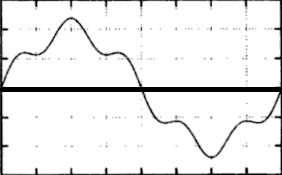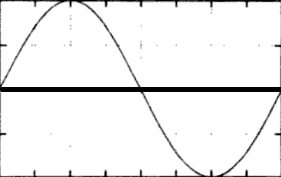Home › Electrical Engineering Forum › General Discussion › Harmonics in electrical systems (back to basics)
- This topic has 6 replies, 4 voices, and was last updated 10 years, 6 months ago by
Anonymous.
-
AuthorPosts
-
2013/08/20 at 2:21 pm #10188
Steven Mill
ParticipantIntroduction
Presence of Harmonics in electrical circuits over the years has become one of the most important areas of concern for almost all the utility companies world over. Keeping harmonic levels as minimum as possible is extremely important for healthy grid operations. Let us examine the aspect of Harmonics in detail.
What is Harmonics?
We all know that the electricity generated and distributed takes a sinusoidal wave form. This wave form is generated at a frequency of 50 cycles / second (or 50 Hz). It is also known as main/fundamental frequency waveform. This is the ideal waveform that is suitable for smooth operations of various electrical equipments, appliances connected to the grid.
However, due to various reasons that will be discussed in next section, this pure sinusoidal waveform gets distorted. Additional waveforms (unwanted) get added on top of the fundamental sinusoidal waveform. A Fourier Analysis of these waveforms reveal that these waveforms are in multiple of the fundamental sinusoidal waveform frequency of 50 Hz. These frequency components that have higher frequencies than fundamental frequency are called “Harmonics”.
Figure below shows Fundamental Sinusoidal waveform and an example of distorted waveform containing harmonic component:
[caption id="attachment_6569" align="aligncenter" width="282"]
Distorted waveform with harmonics[/caption]
[caption id="attachment_6568" align="aligncenter" width="281"]
Sinusoidal waveform[/caption]
Based on the frequency multiple of the harmonic, the harmonic waveforms are named as:
3rd Harmonic (150 Hz), 5th Harmonic (250 Hz), 7th Harmonic (350 Hz) etc.Sources of Harmonics
Harmonics are generated by various electrical equipments connected to the electrical grid.
These equipments include:
- Arc Furnaces
- Electric welding machines
- Thyristor controlled devices like Variable Speed Drives, Soft Starters, Rectifiers
- In some cases transformers, rotating machines
- Elevators, Inverters, UPS, Battery Chargers
Adverse Effects of Harmonics
Presence of harmonics is not good for both utility operators as well as individual customers. Various adverse effects of Harmonics are as follows:
- Increased losses due to distorted waveform. Equipments may get overheated. E.g. transformer overheating, increased losses due to harmonics
- Some of the precision electrical equipments like relays may fail to perform accurately as they are calibrated to work with fundamental waveform at rated values. Harmonics cause false conditions and may lead to equipment malfunction
- Capacitors may get overloaded and may lead to failure
- Undesirable resonance effect seen between inductive and capacitive components
- Interference in communication lines and devices
- Due to introduction of harmonics it may generate irregular voltage and current values in the grid and may unnecessarily increase overall demand in utility grid.
This in turn puts strain on the network
Controlling Harmonics
Presence of harmonics is not good for both utility operators as well as individual customers. Various adverse effects of Harmonics are as follows:
- Limiting non linear load devices (e.g. inverters, UPS) to below 30% of total load on a transformer.
- Use of Harmonic Filters: In cases where it is not possible to limit the non linear load, use of Harmonic filters is recommended.
A Harmonic filter helps to trap the harmonic frequency thereby freeing up the fundamental frequency. In this, the filters are tuned to specific harmonic such as 3rd, 5th, 7th , 11th.
A Harmonic filter provides low impedance to tuned harmonic frequency and bypasses it to earth and thus eliminates harmonics from power supply.
Conclusion
It is extremely important to control harmonics due to their undesirable effects. Utilities and consumers both are fast realizing the importance of controlling harmonics in the network.
Many utilities are making it mandatory for consumers with high non linear load to install harmonic filters.
2013/08/22 at 2:04 am #13348Anonymous
GuestWe have solved the problem of harmonics being generated by a motor starter by using a new technology that starts three phase motors up to 3Kw from a single phase supply. Fastec does not cause any in-rush current and because it disconnects once the motor is started, there are no harmonics fed back into the supply Ref http://www.fastec.co.nz
2013/08/27 at 9:42 am #13351Spir Georges GHALI
ParticipantDears;
Refer to the Topic of Mr. Mill, I would like to mention the following points:
– The number of Harmonic is called “ Order ” ( Harmonic order 3 is the Third Harmonic “ 150 Hz ).
– The “ Soft Starter ” generates the Harmonics only in the starting & stopping steps, and as those steps are transient ( a few seconds ), so, in normal running no Harmonics are generated, and it’s considered that the “ Soft Starter ” are not Harmonics generator.
– The Elevator generates harmonics only if it’s controlled by VSD.
By the way, I want to mention that :
– “ IEC 61000-2-2 & 2-4 ” defined the maximum accepted level percentages of Voltage Harmonics in the LV Networks, either for Distribution Networks, or for privet networks connected to the utilities networks.
– “ IEC 61000-3-2 & 3-12 ” defined the maximum percentages of Current Harmonics that can be generated by electronic equipment, and even the maximum value of “ THD-I ”.
2013/08/27 at 9:55 am #13352Anonymous
GuestHi there, not sure where to post if its wrong please move
I’m working a ship where we have a 6.6 kV 50Hz system that feeds 12-puls converter for propulsion, the same 6.6 kV is also transformed down to 400V for general use. This 400V is also used for feeding a 400V/400V transformer (500kVA) that is used to give power to refrigerator containers. When we only running two diesel generators connected to 6.6 kV net, we get problem with the harmonics created by the converters on this 400V. From the measurement that I have done, we have a voltage THD on the 400 V about 7 to 8 % and it is mostly, due to the 12 – puls converter, the 11th and 13th harmonic that causes us problem.
Now, I’m not wondering about the theory behind as I’m a bit familiar with it but I’m wondering about the hardware. How big would it have to be as there is a space issue onboard and what would an estimated cost for such filter be? When searching for harmonic filters they usually is also used for power factor correction and therefore comes with larger capacitor banks. My only goal here is to remove the harmonics and from my own modest calculation by removing the 11th and 13th harmonic it would bring us down between 5% or 6 %.
Thx in advance for any ideas
Lars
2013/08/28 at 11:24 am #13355Nitesh Mehta
ParticipantRefer to topic mr. Mill i would like to high light the following issues:
The main source of harmonics are non linear load such that UPS, electronic chokes, VFDs, computer and following are the standards to be followed in different regions are :
Name
Type
Countries
IEEE 519-1992 Recommendation North America EN 61000-3-2 Standard Europe EN 61000-3-12 Future Standard Europe G5/4 Recommendation UK HK Code of Practice recommendation Hong Kong EnergieNed Recommendation Netherlands 2013/12/20 at 8:44 am #13394Anonymous
GuestHello, really a great post i can say, perfect details and explanation regarding the Harmonic Frequency Filters and hope to see more, and it was useful.
thank you
2014/08/17 at 11:28 am #13521Anonymous
GuestHi to all, how is the whole thing, I think every one is
getting more from this web site, and your views are good for new users. -
AuthorPosts
- You must be logged in to reply to this topic.
 Distorted waveform with harmonics[/caption]
Distorted waveform with harmonics[/caption] Sinusoidal waveform[/caption]
Sinusoidal waveform[/caption]